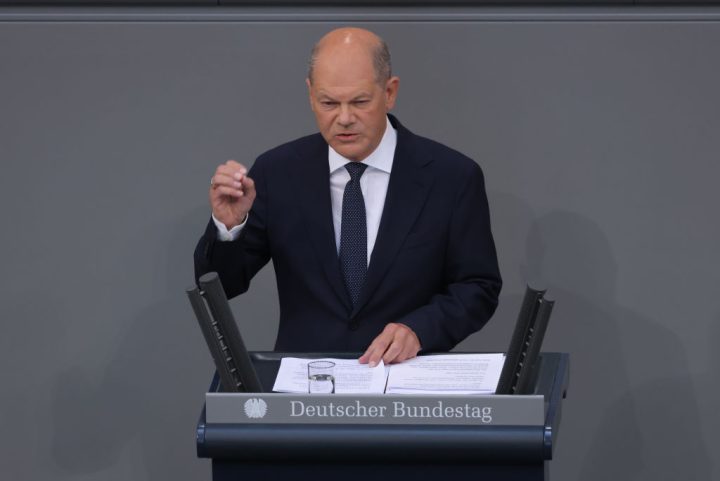‘Anyone who threatens our freedom and disturbs our peace should be afraid.’ That was Olaf Scholz’s message today as he stood up in the Bundestag to announce that foreigners who commit serious crimes in Germany are no longer welcome in the country – even if they are refugees or asylum seekers.
The Chancellor announced that the German Ministry of the Interior is drawing up plans to make it easier to deport foreign-born dangerous individuals and serious criminals to their home countries, even if they come from warzones or countries controlled by authoritarian regimes such as Afghanistan and Syria. ‘Such criminals should be deported – even if they come from Syria and Afghanistan,’ Scholz confirmed.
Scholz wanted to convey the message that Germany’s tolerance for such violent incidents had run out
Scholz’s speech comes nearly a week after a terror incident in the south-western city of Mannheim that claimed the life of a 29-year-old policeman. The knife attack was carried out by a 25-year-old Afghan national who had come to Germany a decade ago. Five other people were also injured in the attack, which took place at an anti-Islamism rally last Friday.
In his speech, the Chancellor wanted to convey the message that Germany’s tolerance for such violent incidents had run out. ‘In such cases, Germany’s security interests outweigh the interest of protecting the perpetrator,’ he declared. ‘Anyone who takes advantage of our protection, like the perpetrator in Mannheim, has forfeited our protection. There is zero tolerance for that’. They must ‘feel the full force of the law.’
To hammer home this ‘zero tolerance’ approach, Scholz went a step further: not only should individuals who commit such crimes be deported, but also those who venerate them. ‘Anyone who glorifies terrorism is going against all of our values and should be deported.’ Referring to the latest in a recent spate of attacks on German politicians in which a local AfD politician was stabbed on Tuesday evening also in Mannheim, the Chancellor pledged more severe punishments for those who threaten or insult politicians.
Scholz’s new policy will understandably draw comparisons to Rishi Sunak’s Rwanda deportation scheme under which the Conservative party wants to send asylum seekers to the African country to have their claims processed. At the heart of both schemes is the desire to bring in a deterrent. But while Sunak is hoping to deter migrants from crossing the channel more broadly, Scholz’s is, at the moment, only honing in on those who have, or who want to, commit crime. As such, where the Tory scheme applies in theory to all those entering the UK ‘illegally’, Scholz’s proposal would apply just to a much smaller number of immigrants who had committed terror-related or violent offences.
Ahead of Scholz’s statement this morning, the Ministry of the Interior took part in a government press conference yesterday at which the department’s spokesperson confirmed this policy had been in the works at least since early 2023. The impetus, Maximilian Kall said, was a terror incident in Brokstedt, North Germany in January of that year when a Palestinian man stabbed nine people on a moving train, killing two teenagers.
Kall also outlined the proposed policy in a little more detail, saying that there were currently 480 individuals the government classed as ‘dangerous individuals’ who would be eligible for deportation. He didn’t state how many criminals would fall under the new policy at this stage. Crucially, Kall clarified that it would not be a case of deciding whether to either deport or imprison criminals of foreign nationality in Germany. These individuals would still be required to serve most of their sentences in Germany first before being deported.
Scholz’s policies will reverse current German law which, in line with the Geneva convention on human rights, prohibits the deportation of individuals to their home countries if they are warzones or if they are at risk of death, torture or inhumane treatment upon their return. Germany ceased deportations to Afghanistan in 2021 following the Taliban’s take-over of the country.
Scholz’s new deportation plan will take time to implement, not least because it will require the cooperation of foreign governments and regimes such as the Taliban to accept their nationals back into their respective countries. Quite how the Chancellor plans to achieve this, he didn’t say, despite being pressed on this by the Green party. Judging by the level of cross-party support Scholz received following his speech, he may well find the policy easier to implement than Sunak with Rwanda here in the UK. Quite whether it will have the deterrent effect Scholz clearly hopes for, is another matter entirely.








Comments